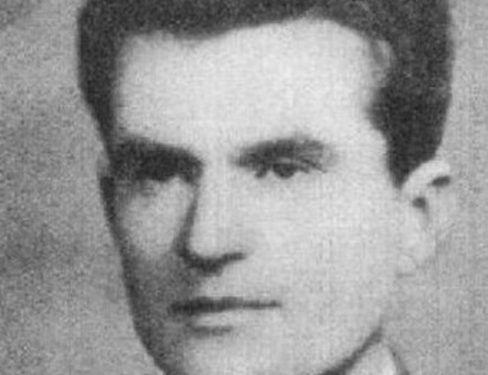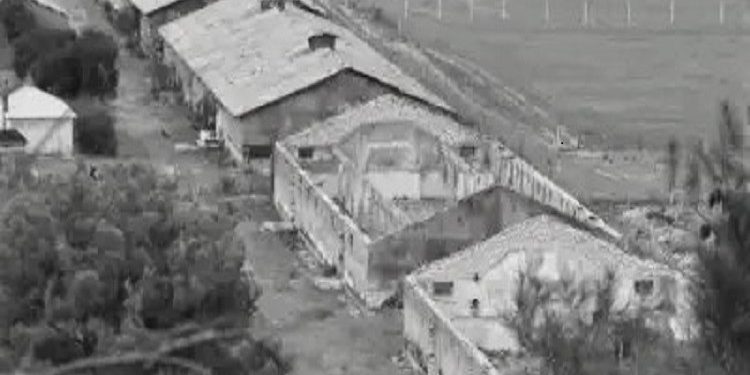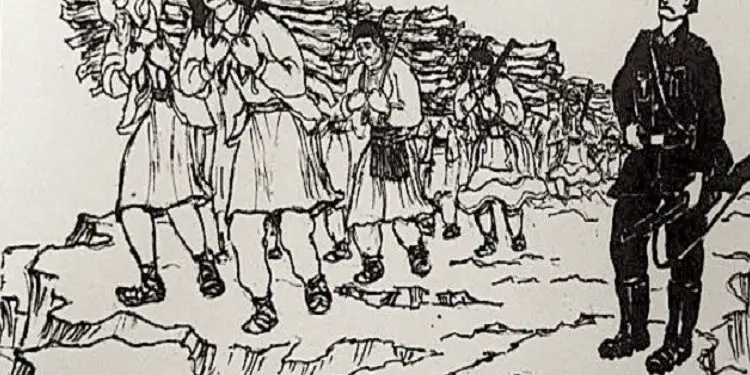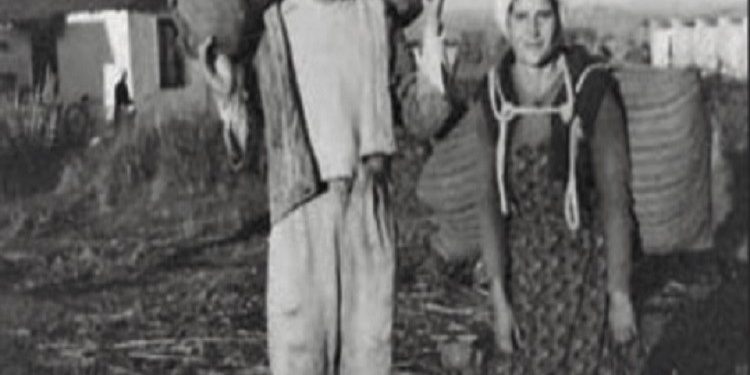Part One
Memorie.al / Vasil Kokali, originally from the village of Aliko in Saranda, was only 21 years old when he was interned in 1946 and he lived in exile until 1991, experiencing the camps with barbed wire, canned food and hard labor, which the communist regime of Enver Hoxha and his successor, Ramiz Alia, offered him for almost half a century. The testimony of Vasil Kokali, who spent all the years of the dictatorship in prison (6 years) and in exile (40 years), is published below in this article, which is taken from the Doko family archive
Vasil Kokali’s full testimony
“I was born in 1924 in the village of Aliko in Saranda and my family was a middle-class family. We had livestock, we were involved in trade. I was six months old when I left, because my father had started working as a trader in Saranda and he pulled us as a family. Then, during the War, in 1941, we left Saranda, for fear of bombings, and went to the village. There, we started working in agriculture, but in 1943, when the partisan detachments began, they called on my father to take part in these.
They were more propaganda for communism than for the National Liberation War. They told us that; you will eat with spoon gold. In fact, we didn’t want to eat with a gold spoon; we wanted the spoon we had. That was the reason they interned us. Since we didn’t embrace that ideology, we were categorized as a family that was against communism. In ’43, when the Germans wanted to cross into Albania, my father said: Let them cross, because they came to cross, they didn’t come to conquer us’.
What happened after the establishment of the communist regime with you and your family?
We were always seen as enemies against the government, so they abused us. When the Germans wanted to cross, they called my father a collaborator and a 5th Column and so they sentenced him to death. My father was forced to flee, because there was no point in staying here anymore and after my father escaped, we were interned. They took us to the city of Kruja.
In what year were you interned?
Since 1945. But before they interned us, they took all our property. We had about 100 cows, we had them in Kakome in Nivica, they went there and seized them, and they even opened our grain warehouse and we were certainly unhappy, since this was done to us unfairly. At that time, they interned us. They didn’t even let us take anything from the house, only the clothes we were wearing. When we went to Krujë, we didn’t even have spoons to eat with, we ate with wooden spoons.
They kept us in Krujë for two years, with 600 grams of corn bread that was both food, and forced labor. They kept us there with 600 grams of corn bread, absolutely nothing else…! I don’t know what these people were thinking: how did we live, with 600 grams of corn bread, without food, without anything…?! In conclusion, in 1947, it was July, when they took us from Kruja. They transferred us, separated us.
Where did they send you after Kruja?
Some of them were sent to the Sukthi farm, in the Kulla sector, Rrushkull, while we were taken to Kashar, where the Radio Station is. There they made the contract with the Rruga-Ura enterprise. When we went there, we found the tents pitched. The next morning, they gave us the pickaxe, the shovel, to tear up the asphalt that was stronger than concrete.
After the work there was finished, we went to Kater Rrugët e Shijakut. There we met some internees, who had come from the Berat camp. They worked from Kater Rrugët e Shijakut, to Rrushbull, while we, from Kater Rrugët e Shijakut, to Kashar, meaning we had two sectors. Finally, when the work there was finished, they brought us to Valias.
What were the living conditions like in the Valias camp?
In Valias, there was absolutely nothing. There were two old houses, with the villagers’ stables. They had also removed the villagers because it became a farm, we didn’t know where they had taken them, and in those destroyed houses, we lived. The mud was up to our knees, we worked digging holes, transporting manure from Xhafzotaj, at night with those tractors, rain or shine…! They also prepared food for us with those cabbages and onions that the wind smelled of, 500 m away. Without oil, without anything. We spent a couple of years there. After two years, they transferred us…!
Where did they take you?
They separated us from our families again and took us to Lozhan in Korça. Before taking us to Lozhan, they kept us for 17 days in the open air, without anything. There, in the end, about 9 people escaped, escaped, went across the border, to Greece. One of those Bajraktarës was called Nikollë Gjoni, the sons of Cen Elezit, Esat Dine, they killed him at the border, one was captured from there by Puka, a Selim, I don’t remember his last name.
They pressed us a lot…! After 17 days, with our rracks, which we had on foot, we passed Grabova A, Grabova B, Strelce, Nikollare, Shën e Premte…! After three days, exhausted and tired, we arrived in Lozhan in Korça, the Maliqi field. We ate wild grapes from hunger. We were lying down for four days, because a food truck had broken down, after four days, another truck came and put those cauldrons, so that we got that ration of food.
What work did you do there?
We had a hard job; we opened a road in Lozhan. The work was hard, anyone who didn’t meet the quota was put in water up to their waists and people were beaten, there were few who survived. A Nikollë Biçuni and a Xhorxhi were beaten, the one from Gumenica was a Cham…! It was only when the blood started gushing from their mouths that the lieutenant who had torn them to pieces left them. There, they brought about 80 Chams, because they hadn’t heard of them going to join the EAM forces, to fight against the royal army, and they brought them there to us.
They eventually did the same work as we did, but one day, an officer, Zoi Themeli, comes…! I was working. That “ZIS” comes, stops there, says to me: “What are you: an internet or one of these Chams?”. “No,” I said, “I am an internee.” – “Where is that officer who is responsible for these?” – “There, in that tent.” He listened. They greeted him. – “I released the Chams,” he tells him. I heard him.
I said: “They released them; maybe we’ll leave one day too”. We were tired; we were exhausted with that work. I had a close Cham friend, and I said to him: “I heard about the releases, but don’t tell anyone, because if the lieutenant finds out, he’ll kick my ass”. – “No, I won’t tell anyone”. But he opened it up and spread the word; “we’ve been released”, “we’ve been released” and it became like a strike…! And the lieutenant found out: “Who told you”?!
And he started beating the Chams, but that Cham didn’t give my name. After a while they transferred us. Who knows how the Ministry of the Interior saw fit, and me and six other friends who were from the North camp, joined us with the Tepelena camp. From Lozhani they transfer us to Porto-Palermo. On the way we get caught in a rainstorm. That night we slept in Elbasan. The next day, we went to Porto-Palermo at 10:00 at night. There we slept in a nearby church. In the morning, they brought us to the castle.
How did you live inside the Porto-Palermo castle?
The Porto-Palermo Castle is…it’s terrifying to see from the outside, not to go inside. It was…I don’t know how…what these people thought. I don’t know what they thought. They didn’t feel sorry for those children; there were women, children, old women, old men…! Some came from Tepelena. They had separated the husband from the wife, the women from the children; they had brought the best families, the most famous families: Gjon Markagjoni, Mirakaj’s, Cen Elezit’s, Muharrem Bajraktari’s…!
There, we had very difficult conditions. We drank salt water. We didn’t even wash ourselves. These commandos had found the springs, they had a mule and they filled the water from the spring. Our fate was that we escaped from there, it was an Italian ship, it was loaded with planks and was going to Greece.
The waves hit it at night and it rolled into it like an island, so the next morning, when they saw that ship, they were terrified. They came and saw us, whether we were there or not. They immediately notified Vlora and from Vlora they brought the Soviet cars, “ZIS”. They came, loaded us and took us to Tepelena. We suffered the black olives there in Porto-Palermo. People were blinded by their eyes. They couldn’t see, from the lack of food. 400 grams of rye bread, and five grains of legume, that was our menu.
I knew a policeman who was from Qeparo, a Zaho Dede, he was a good guy. He trusted me, because my sister was married there and he knew who I was and he said to me: “Woe to you”. Why? I said. “Because Porto-Palermo is a camp that you can enter and not leave”. But they had also brought many prisoners there, who were being released from prison, like Viktor Dostin, this Bardh Kupin, two officers who were here from Tirana, officers of the Ministry and kulaks, they had brought them there.
How were the conditions in Tepelena, compared to Porto-Palermo?
Now, to be honest, we remembered that we escaped from the rain, but we fell into a hailstorm, but what a hailstorm, a big hailstorm! We had absolutely no rights. Our lives were lost in the camps; we grew up and grew old in the camp. There, the work was very hard.
Plus, it was hard, we were loaded with wood, 7 km. away from Turhan, but even those who were like families, who were for example two young boys, they took them to Luzat, some to Bënçë, far from the camp and we would go on Saturday evening and return again on Saturday evening. That work was very hard. From the rolling of the beams, the stones, that we threw like that, because we had no way to throw them, there were not weeks without someone being injured. It was terrifying.
What episodes do you remember from Tepelena?
Those who were in Luzat lived in a hut. They were even wet, but they lit a poor fire to keep warm. A neighbor, because this hut was close to the village, had slaughtered a goat and given them the insides. These people, out of hunger, even ate the hooves, no more…! And they washed these, put them in a pot and put them on a fire. However, they had put socks on top of the fire and those stocks fell into the pot.
When they removed the pot, they saw the socks and realized that they had fallen, but they did not ask why the unwashed socks had fallen, but they ate them. Out of hunger, what can a person not do…! Another case, there in Luzat. The captain, who accompanied us, because they were from the Ministry of the Interior, was from the Pursuit Battalion in Tepelena, and the captain often came to that room.
In that room, 20 men lived. We had a fire there, so we could cook something. Even one of the people from Dumre, his own people had brought some rosnica, and he was boiling them. At that time, while he was boiling those rosnica, that captain comes. By chance. – “What does this smell like?” – He says. – “I’m boiling rosnica, my people brought it from home,” he says. “But if I give you 1 kilo of pasta, can you eat the rosnica, boiling it like that?” –
“Yes”, – he says. And he started. I couldn’t believe it, I was there myself, I saw it with my own eyes. He ate the rosnica: the drawer was boiling, he was eating it. I was surprised. I was surprised how it was possible for a person to eat the rosnicas…but also to benefit from that kilo of pasta from hunger! That no matter who you tell it to, they won’t believe it.
What did you do next?
In conclusion, we were going to the camp to wash up. He put us in front, just like those goats, and one, Veiz Gjolena, from Elbasan, had a stomachache…! “Captain, like this, like this”, – he says. – “Do it there in your trousers”. Forgive me for the expression; he did it in your trousers. At the camp, the camp director, Xhafer Pogaçe, comes out to us, he looks at us like this. “You’ve brought so many fat people this time. These people have no business”, – he said. Imagine now, that we had become telef…they wanted to see us like this. We removed the black olives in Tepelena. We spent some time there, and then they transferred us. Memorie.al














